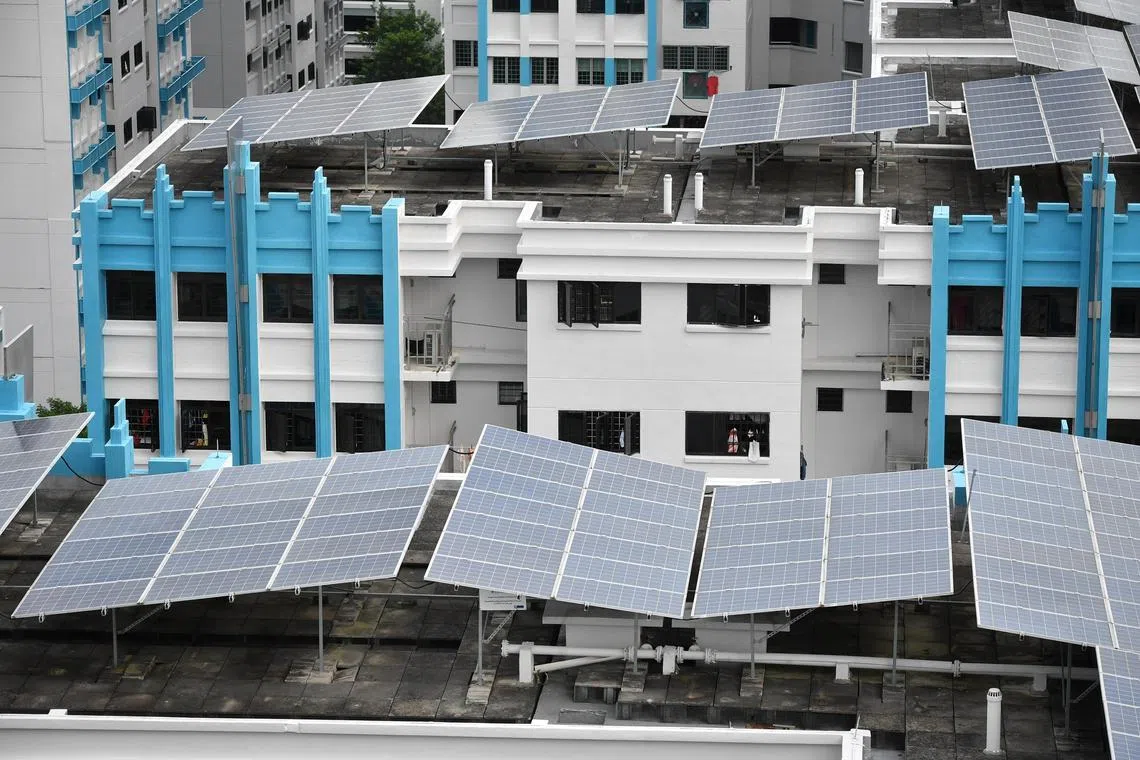MPs call for less waste, more clean energy sources and more support for businesses to go green
Sign up now: Get ST's newsletters delivered to your inbox

Nominated MP Koh Lian Pin envisioned a Singapore in 2050 where every building will have solar panels.
PHOTO: ST FILE
SINGAPORE - Singapore’s ability to meet the challenges of climate change head-on was a common thread across MPs’ speeches in Parliament on Thursday, as they debated whether the country and its people were doing enough to go green.
MPs from both sides of the House raised various suggestions to retool infrastructure to meet climate unpredictability, reduce consumption, make business practices greener, and strengthen the Republic’s energy resilience.
On the second day of the Budget debate, Nominated MP Koh Lian Pin said that amid concerns about inflation and the economy, issues such as climate change and sustainability must always be among the bread-and-butter issues that Singapore focuses on.
Budget 2023 did not introduce new sustainability-related measures but highlighted the work already under way to fight climate change and cut carbon output to reach net zero emissions by 2050.
Deputy Prime Minister Lawrence Wong said in his Budget speech on Feb 14 that climate-related spending is expected to go up significantly
Prof Koh, a conservation scientist, envisioned a Singapore in 2050 where every building will have solar panels, every vehicle is electric, and streets are lined with even more trees.
With its waterways and coastlines showcasing world-leading technology- and nature-based solutions that offer optimal protection against storm surges and sea level rise, the country would be an international hub for climate and sustainability solutions, he described, while urging more effort to realise this reality.
Ms Carrie Tan (Nee Soon GRC) called on Singaporeans to reduce wasteful consumption.
“In our daily lives, we currently have an increasing norm of online shopping where we can buy something for as cheap as $3 and have it shipped to our door in layers of boxing and packaging,” she said, suggesting that swopping and sharing items be encouraged instead.
On the business front, Mr Derrick Goh (Nee Soon GRC) said that while Budget 2023 retains existing measures such as the Resource Efficiency Grant for Energy, as well as the Enterprise Sustainability Programme by EnterpriseSG, he was uncertain if these could help to push small and medium-sized enterprises to step up their green efforts sufficiently and in time.
With larger firms increasingly expecting their suppliers to be green, SMEs need help to move more quickly or risk being left out of tomorrow’s supply chain, he added.
Conversely, businesses further along in their transformation should partner to create a credible regulatory framework for voluntary carbon credits in Singapore. These efforts will help establish Singapore as a growing and leading green hub, said Mr Goh.
Workers’ Party MP He Ting Ru (Sengkang GRC) noted that rising temperatures will affect blue-collar workers, migrant workers and gig workers more than other groups, as she called for more measures to enable them to adapt to the effects of extreme heat.
At the same time, more needs to be done to sustainably cool down buildings here, said Ms He. She proposed more investment in better cooling infrastructure when building flats, especially rental flats.
MPs also called on the Government to strengthen Singapore’s energy security. Dr Lim Wee Kiak (Sembawang GRC) noted the global problem of energy supply disruptions amid the Russia-Ukraine war.
“It exposed our vulnerability due to our over-reliance on natural gas and oil for our energy needs. I suggest we need to urgently explore more ways to expand and ramp up our adoption of solar energy,” he said.
He also raised the possibility of using nuclear energy.
“It is time to make a bold decision on whether this is one of the best options for us to ensure our energy resilience,” he said, noting that factors such as cost, technology and safety must be considered.
He suggested that Singapore could explore building such a facility on an offshore island, on a man-made rig in the sea, deep underground or even on the sea bed.
Noting that it normally takes 10 to 15 years to build a nuclear power plant, Dr Lim asked if the Government has a timeline in pursuing this energy option.
Ms Poh Li San (Sembawang GRC) questioned if Singapore has sufficient expertise in the area of green energy transition, and asked if the country should invest more to attract experts here and to develop local talent to focus on the solutions required in the energy sector.
She added that it is uncertain when and if green hydrogen-powered electricity is economically viable, and questioned how Singapore can ensure any import supply would be extended infinitely while keeping the cost of imported electricity affordable.
Imploring Singaporeans to play their part, Ms Carrie Tan said: “The only way to avoid the crisis is to consume and produce in ways that are transformatively different from before.
“If we do not start regenerating our Earth, we are consuming it to death and putting humanity on the trajectory to an era of war and destructive competition, which is already beginning to set in.”



